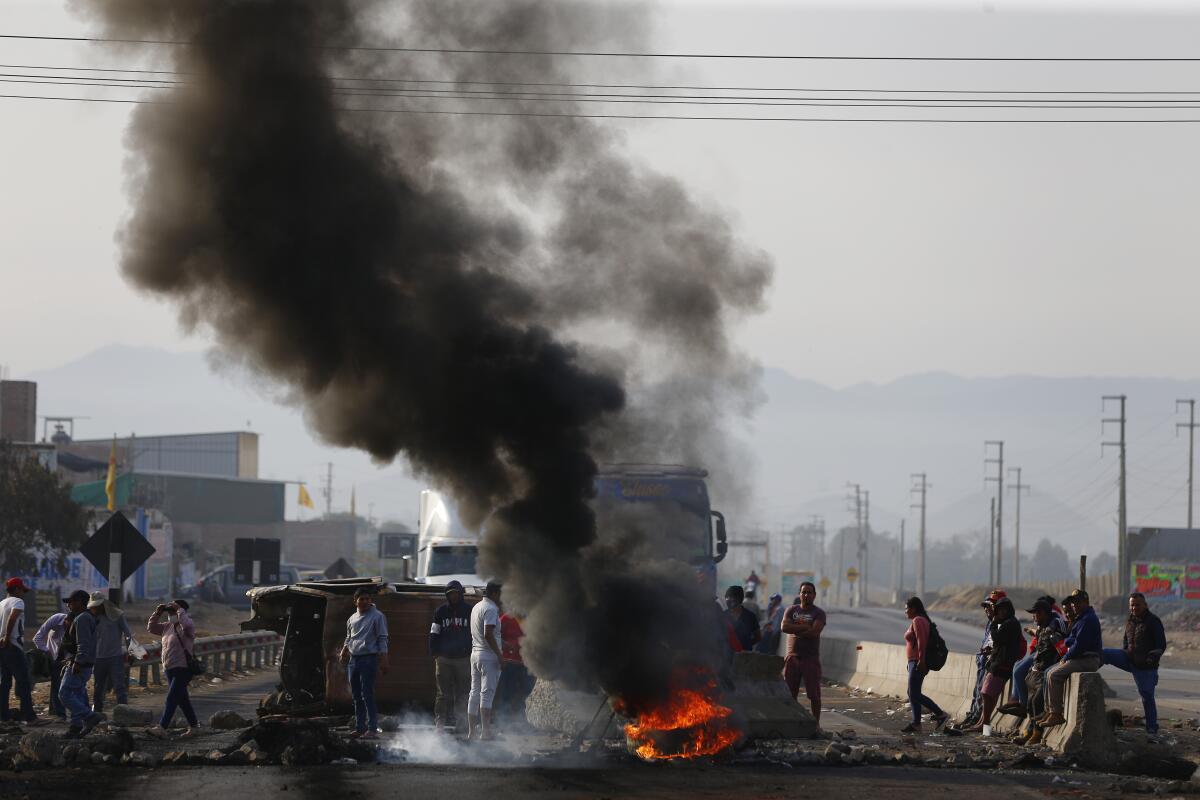Peru judge orders 18-month detention for ousted president

- Share via
LIMA, Peru — A Peruvian judge on Thursday ordered ousted President Pedro Castillo to remain in custody for 18 months, approving a request from authorities for time to build their rebellion case against him.
The judge’s decision came a day after the government declared a police state as it struggles to calm violent protests that have led to at least 14 deaths. The Ministry of Health reported 40 people had been hospitalized for injuries suffered during the unrest.
The protests erupted after Castillo was voted out of power by lawmakers last week following his attempt to dissolve Congress ahead of a third impeachment vote.
The crisis has only deepened the instability gripping the country, which has had six presidents in as many years.
Judge César San Martín Castro’s ruling came days after Congress stripped Castillo of the privilege that protects Peru’s presidents from facing criminal charges.
Castillo and his legal team refused to participate in Thursday’s virtual hearing, arguing it lacked “minimum guarantees.” He was represented by a public defender, who said the judge’s decision to detain Castillo would be appealed.
Peru’s Supreme Prosecutor Alcides Chinchay said in court Thursday that Castillo would face at least 10 years in prison if convicted of the rebellion charge.
In issuing his ruling, Castro said the former president still presented a “concrete flight risk.” Besides Castillo’s apparent effort to reach the Mexican Embassy, the judge cited remarks from Mexico’s president and foreign minister on their country’s willingness to offer Castillo asylum, as well as a jail visit he received from the Mexican ambassador in Peru.
Castillo’s public defender, Italo Díaz, denied that the former president is a flight risk. He told the judge that Castillo’s children and wife depend on him and that he could return to his teaching job if freed.
Castillo is being held at a detention center built for presidents inside a National Police facility. On Thursday, police in riot gear stood outside the facility as dozens of Castillo supporters gathered throughout the day.
Meanwhile, a large group of protesters — and police in riot gear — gathered in central Lima, the capital, on Thursday evening. The government also imposed a curfew in at least 15 communities under the nationwide emergency declaration issued Wednesday.
The protesters demanded Castillo’s freedom, the resignation of President Dina Boluarte, and the immediate scheduling of general elections to pick a new president and Congress. Demonstrators have burned police stations, taken over an airstrip used by the armed forces and invaded the runway of the international airport in Arequipa, a gateway to some of Peru’s tourist attractions.
Thousands of tourists have been affected by the protests. The train that carries visitors to Machu Picchu suspended service, and roadblocks on the Pan-American Highway stranded tractor-trailers for days as food bound for the capital spoiled.
In Cuzco, a top tourist destination, people were stuck Thursday at hotels and the airport.
“I was about to return to Ecuador on Monday, and unfortunately, they told us that all flights were canceled due to the protests,” said Karen Marcillo, 28, who has had to sleep at the Alejandro Velasco Astete International Airport in Cuzco.
The impact on tourism comes as Peru is still recovering from the effects of the pandemic, which reduced visits last year to 400,000, down from 4.4 million in 2019.
While in office, Castillo spent much of his time defending himself against attacks from an adversarial Congress and investigations into accusations of wrongdoing including corruption and plagiarism. It is unclear whether Boluarte — once his running mate and vice president — will get much opportunity to govern. Like Castillo, she is a newcomer to politics without a base of support in Congress.
“She’s doing a good job right now, for the moment,” said Cynthia McClintock, a professor of political science and international affairs at George Washington University who has studied Peru extensively. “But it’s a big challenge.”
While some protesters “seem to want kind of instability at any cost,” McClintock said, others see his ouster as an opening to express simmering grievances, such as deep inequality, poverty and lack of public services.
Boluarte might be given some breathing room by lawmakers seeking to keep their jobs. They cannot pursue reelection and will be jobless if a general election for Congress is scheduled, as protesters want.
Boluarte sought to placate protesters Wednesday by saying general elections could potentially be scheduled for next December, four months earlier than she had proposed to Congress a few days earlier.
Many of the protest-related deaths have occurred in relatively rural, impoverished communities outside Lima that are strongholds for Castillo, a political neophyte and former schoolteacher from a poor district in the Andean Mountains.
In the city of Andahuaylas, where at least four people have died since the demonstrations began, no soldiers were on the streets Thursday despite the government declaration allowing the armed forces to help maintain public order.
Some grocery store owners there were cleaning roads littered with rocks and burned tires, but said they planned to close their doors due to expected protests led by people from nearby rural communities.
After Congress voted him out of power, authorities intercepted Castillo’s vehicle and arrested him as he traveled through Lima’s streets with his security detail.
The state of emergency declaration suspends the rights of assembly and freedom of movement and empowers the police, supported by the military, to search people’s homes without their permission or a judicial order.
Defense Minister Luis Otarola Peñaranda said the declaration was agreed to by the council of ministers.
On Wednesday, Boluarte pleaded for calm as demonstrations against her and Congress continued.
“Peru cannot overflow with blood,” she said.
In a handwritten letter that Castillo associate Mauro Gonzales shared with the Associated Press on Wednesday, the former president asked the Inter-American Commission on Human Rights to intercede on his behalf and for his “Peruvian brothers who cry out for justice.”
The commission investigates allegations of human rights violations and in some cases litigates them.
AP writers Franklin Briceño in Andahuaylas, Peru, David Pereda in Lima and Gonzalo Solano in Quito, Ecuador, contributed to this report.
More to Read
Sign up for Essential California
The most important California stories and recommendations in your inbox every morning.
You may occasionally receive promotional content from the Los Angeles Times.










